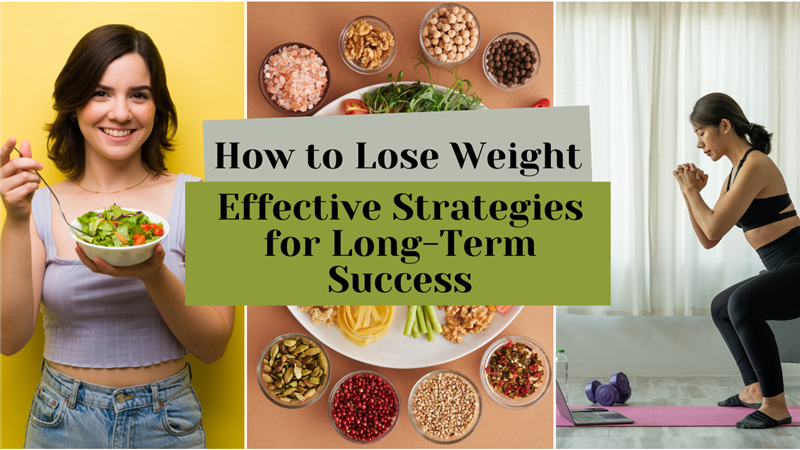Losing weight is one of the most common health goals for people around the world. Whether it’s to improve physical health, increase energy levels, or boost self-confidence, shedding extra pounds can have a powerful impact on your overall well-being. However, many struggle with figuring out how to lose weight effectively due to the overwhelming amount of conflicting advice.
The key to successful weight loss lies in adopting realistic and sustainable habits. Rather than following extreme diets or short-term fads, focus on making gradual changes to your eating and activity patterns. This includes consuming whole foods, staying hydrated, getting enough sleep, and engaging in regular physical activity. These healthy habits can help you lose weight steadily while supporting your long-term health.
If you’re wondering how to lose weight and keep it off, the answer is to prioritize consistency over perfection. With patience and persistence, lasting results are not only possible—they’re achievable.

Understanding Weight Loss
Weight loss is the process of reducing body fat through a combination of healthy eating, regular exercise, and lifestyle changes. It’s not just about looking good—it’s about improving overall health, boosting energy, and reducing the risk of chronic diseases like diabetes and heart conditions.
Many people struggle with how to lose weight because they rely on quick fixes or extreme diets. However, sustainable weight loss comes from creating a calorie deficit by consuming fewer calories than your body burns, without starving yourself or skipping meals.
Exercise plays a crucial role in weight loss. It helps burn calories, builds muscle, and supports a healthy metabolism. Combining cardio with strength training can accelerate results and promote long-term success. Simple changes like walking more, taking stairs, or doing short home workouts can make a big difference.
To truly understand how to lose weight effectively, it’s important to stay consistent, set realistic goals, and be patient. Avoid comparing yourself to others and focus on gradual progress. With the right mindset and approach, weight loss can be both achievable and lasting.
The Science Behind Weight Loss
At its core, learning how to lose weight means understanding and creating a calorie deficit—consuming fewer calories than your body burns. Your body needs energy for essential functions like breathing, circulating blood, and digesting food. When your calorie intake is less than what your body requires, it turns to stored fat for energy, leading to gradual and healthy weight loss over time.
However, how to lose weight effectively isn’t just about cutting calories. It’s about making sustainable changes that support this calorie deficit without harming your health. This includes mindful eating, choosing nutrient-dense foods, staying physically active, getting enough sleep, and managing stress. Consistency in these habits plays a major role in long-term success. Instead of relying on drastic diets or extreme measures, focus on small, realistic changes that you can maintain. That’s the true foundation of how to lose weight and keep it off.
Step-by-Step Guide on How to Lose Weight
Let’s explore the steps in detail that will help you effectively lose weight and keep it off.
Set Realistic and Measurable Goals : One of the first steps in learning how to lose weight is setting realistic and measurable goals. Instead of aiming for drastic changes overnight, focus on small, achievable milestones—like losing 1–2 pounds per week. Track your progress with tools like food journals or fitness apps to stay accountable. Setting specific goals helps you stay motivated and gives you a clear path forward. Remember, how to lose weight effectively starts with a practical and patient mindset.
Start with SMART goals — Specific, Measurable, Achievable, Relevant, and Time-bound. For example:
Bad goal: “I want to lose weight.”
Good goal: “I want to lose 10 pounds in the next 2 months by exercising 5 times a week and eating a healthy diet.”
Calculate Your Caloric Needs : Understanding your daily caloric needs is essential when figuring out how to lose weight. Everyone requires a different number of calories based on factors like age, gender, weight, activity level, and metabolism. Use online calculators or consult a nutritionist to estimate your maintenance calories. To lose weight, you’ll need to create a moderate calorie deficit—usually by eating slightly less and moving more. Knowing your caloric needs gives you a solid foundation for planning a healthy weight loss journey.
Example formula (Mifflin-St Jeor Equation):

For men:
TDEE = 10 × weight (kg) + 6.25 × height (cm) – 5 × age (y) + 5
For women:
TDEE = 10 × weight (kg) + 6.25 × height (cm) – 5 × age (y) – 161
Once you have your TDEE, aim for a 500-700 calorie daily deficit to lose about 1-1.5 pounds per week, a safe and sustainable rate.
Eat a Balanced, Nutrient-Rich Diet : One of the most effective ways to learn how to lose weight is by eating a balanced, nutrient-rich diet. Focus on whole foods like vegetables, fruits, lean proteins, whole grains, and healthy fats. These foods provide essential nutrients while keeping you full and energized. Avoid highly processed items high in sugar and unhealthy fats. Portion control is also key—eating healthy doesn’t mean overeating. A well-balanced diet supports metabolism and makes how to lose weight a sustainable process.
Focus on Whole Foods:
Lean proteins: Chicken, turkey, fish, eggs, legumes
Healthy fats: Avocados, nuts, seeds, olive oil
Complex carbohydrates: Brown rice, oats, quinoa, sweet potatoes
Fruits and vegetables: Packed with fiber, vitamins, and water
Hydration: Drink Plenty of Water : Staying hydrated is a simple yet powerful tip for anyone learning how to lose weight. Drinking enough water helps boost metabolism, supports digestion, and can reduce unnecessary snacking by curbing hunger. Sometimes, thirst is mistaken for hunger, leading to extra calorie intake. Aim for at least 8 glasses of water daily, and choose water over sugary drinks. Proper hydration keeps your body functioning efficiently and plays an important role in your overall weight loss success.
Exercise Regularly: Regular physical activity is a crucial part of any plan on how to lose weight. Exercise helps burn calories, builds muscle, and boosts metabolism, all of which support weight loss. Aim for a mix of cardio (like walking, cycling, or swimming) and strength training exercises. Consistency matters more than intensity—find activities you enjoy so you’ll stick with them. Combined with a healthy diet, regular exercise makes how to lose weight more effective, sustainable, and beneficial for your overall health.
Cardio Workouts:

Running, swimming, cycling, brisk walking
Aim for at least 150 minutes of moderate cardio or 75 minutes of vigorous cardio weekly
Strength Training :
Lifting weights, resistance bands, bodyweight exercises
2–3 sessions per week help retain muscle and increase resting metabolic rate
Get Quality Sleep : Getting enough quality sleep is often overlooked but essential when learning how to lose weight. Poor sleep can disrupt hormones that control hunger and cravings, leading to increased appetite and overeating. Aim for 7–9 hours of restful sleep each night to support your metabolism and energy levels. Establish a regular sleep schedule and create a relaxing bedtime routine. Prioritizing sleep not only improves your overall well-being but also plays a key role in how to lose weight effectively.
Sleep is often overlooked but is crucial in any plan on how to lose weight.
Aim for 7–9 hours of quality sleep per night
Poor sleep affects hunger hormones (ghrelin and leptin), increasing appetite
Manage Stress : Managing stress is an important yet often underestimated part of learning how to lose weight. Chronic stress increases cortisol levels, which can lead to cravings, emotional eating, and fat storage—especially around the belly. Practicing stress-reducing activities like meditation, yoga, deep breathing, or simply taking time for hobbies can help keep your mind and body balanced. When you’re calm and in control, you’re more likely to make healthy choices. Managing stress effectively supports long-term success in how to lose weight.
Ways to reduce stress:
Meditation
Deep breathing
Journaling
Nature walks
Socializing
Track Progress Without Obsessing :Tracking your progress is helpful when learning how to lose weight, but it’s important not to become obsessed with the scale. Weight can fluctuate due to many factors like water retention or muscle gain. Instead, focus on overall trends, how your clothes fit, and how you feel. Use tools like food diaries or fitness apps to stay accountable. Celebrate small victories and remember that consistency is key. A balanced approach makes how to lose weight more enjoyable and sustainable.
Use multiple tools to monitor your progress:
Scale weight: Check once a week, not daily
Measurements: Track waist, hips, and thighs monthly
Progress photos: Provide visual motivation
Fitness improvements: How many pushups you can do, how long you can run
Popular Diets: Pros and Cons
There’s no one-size-fits-all diet. Understanding the pros and cons of popular approaches can help find what works for you.

Keto Diet : The keto diet is popular for those learning how to lose weight quickly. It involves a high-fat, low-carb approach that often results in rapid weight loss and reduced appetite. However, it can be highly restrictive, may lack essential fiber, and is hard to maintain long-term. While effective for some, it’s important to monitor nutrient intake and consider sustainability when choosing how to lose weight with this method.
Intermittent Fasting (IF) : Intermittent Fasting is a time-based eating pattern that can help reduce calorie intake and improve insulin sensitivity, making it a useful option for those exploring how to lose weight. It doesn’t focus on what you eat, but when you eat. However, some may experience fatigue, irritability, or energy dips during the adjustment period. Success with this method relies on choosing nutrient-rich foods during eating windows to support overall health.
Plant-Based Diet : A plant-based diet is rich in fiber, heart-healthy, and often chosen for ethical reasons. It emphasizes fruits, vegetables, legumes, and whole grains, making it a great choice for those researching how to lose weight naturally. However, it requires careful planning to ensure adequate intake of key nutrients like protein, iron, and vitamin B12. When well-balanced, it can support long-term weight loss and improve overall wellness.
Mediterranean Diet : The Mediterranean diet is widely regarded as one of the healthiest and most sustainable ways to eat. It includes plenty of vegetables, fruits, whole grains, lean proteins, and healthy fats, making it ideal for those focused on how to lose weight healthily. Though it may not result in rapid weight loss, it promotes long-term success and is backed by strong scientific evidence. It’s a lifestyle more than a strict diet.
Common Weight Loss Mistakes to Avoid
Skipping Meals : Many people trying to learn how to lose weight think skipping meals will help reduce calories. In reality, this often leads to intense hunger and overeating later in the day. Skipping meals can also slow metabolism and drain your energy. Instead, aim for regular, balanced meals and healthy snacks to maintain stable blood sugar levels and support a steady, sustainable approach to how to lose weight effectively.
Relying on Supplements: While weight loss supplements may promise quick results, they’re not a magic solution for how to lose weight. No pill can replace a healthy diet and regular exercise. Relying too heavily on supplements can lead to disappointment and neglect of essential lifestyle changes. Focus instead on whole foods, physical activity, and proper hydration. Supplements should only complement—not replace—your overall weight loss strategy.
Expecting Overnight Results : One of the biggest mistakes in learning how to lose weight is expecting instant success. Healthy weight loss is a gradual process that requires consistency and patience. Quick fixes often result in regaining the weight. Focus on building habits that support long-term success, such as balanced eating, regular activity, and self-care. Remember, how to lose weight sustainably means aiming for progress, not perfection, over time.
Neglecting Strength Training : Cardio is great, but ignoring strength training is a mistake when learning how to lose weight. Strength exercises help build lean muscle, which boosts your metabolism and supports fat loss. Without it, you risk losing muscle along with fat, which can slow your progress. Incorporate resistance training 2–3 times a week to enhance your results and improve your overall body composition.
Not Reading Food Labels :Not checking food labels is a common misstep for those learning how to lose weight. Many packaged foods contain hidden sugars, unhealthy fats, and excess calories that can derail your progress. Always read nutrition labels and ingredient lists to make informed choices. Understanding portion sizes, added sugars, and calorie content can help you stay on track and support smarter, healthier eating habits.
Supplements: Do They Help With Weight Loss?
Supplements can assist your journey, but they cannot replace healthy lifestyle changes when learning how to lose weight.
Protein Powder : Protein powder is helpful for meeting daily protein needs, especially for those with busy lifestyles. It supports muscle repair and helps control appetite—key factors in how to lose weight effectively.
Fiber Supplements : Fiber supplements can aid digestion and promote fullness, reducing the urge to overeat. This makes them a useful addition for those exploring how to lose weight, especially if their diet lacks fiber-rich foods.
Green Tea Extract : Green tea extract may provide a slight boost to metabolism, supporting fat burning. While not a miracle solution, it can be part of a balanced plan for how to lose weight when combined with diet and exercise.
Probiotics : Probiotics support gut health, which can influence digestion and weight regulation. A healthy gut can improve how your body processes food—an important factor in how to lose weight naturally and sustainably.
Conclusion
Learning how to lose weight is just the beginning of your transformation journey. It’s not about crash diets or chasing quick fixes, but about building habits that last. Understanding how to lose weight means recognizing that real change comes from consistency, patience, and a willingness to grow. By taking small, manageable steps each day, you can move closer to your goals without feeling overwhelmed or discouraged.
Whether your motivation is to feel more confident in your clothes, improve your energy levels, or enhance your long-term health, the path forward is achievable. The key is to stay committed and focus on progress rather than perfection. Some days will be easier than others, and that’s completely normal. What matters most is showing up for yourself—even in the smallest ways. Remember, how to lose weight successfully involves more than just a number on the scale; it’s about improving your overall quality of life.
Start today. Make one healthier meal, take one short walk, or drink one more glass of water. These small actions add up over time. Stay consistent, trust the process, and be kind to yourself. With the right mindset and effort, your goals around how to lose weight can become a lasting reality.
How to lose weight in a healthy and sustainable way?
To lose weight healthily, focus on balanced nutrition, regular exercise, adequate sleep, and stress management. Avoid extreme diets or quick fixes.
How to lose weight without going to the gym?
You can lose weight without the gym by doing home workouts, walking regularly, practicing yoga, and maintaining a calorie-controlled diet.
How to lose weight while managing a busy schedule?
Plan meals ahead, choose quick healthy recipes, stay active with short workouts, and avoid processed foods. Small changes can lead to big results.
How to lose weight without giving up favorite foods?
Practice portion control, enjoy treats in moderation, and balance indulgences with healthy meals and physical activity to maintain progress.
How to lose weight if nothing has worked before?
Reassess your current approach, consult a health professional, and focus on consistency. Personalized plans often lead to better results.

